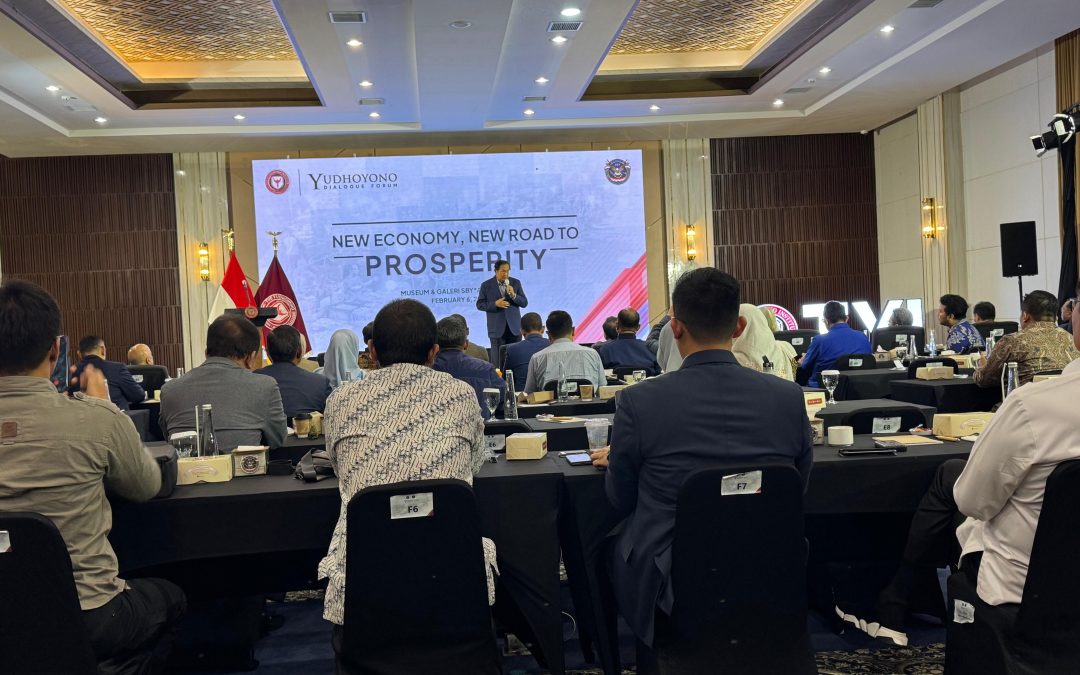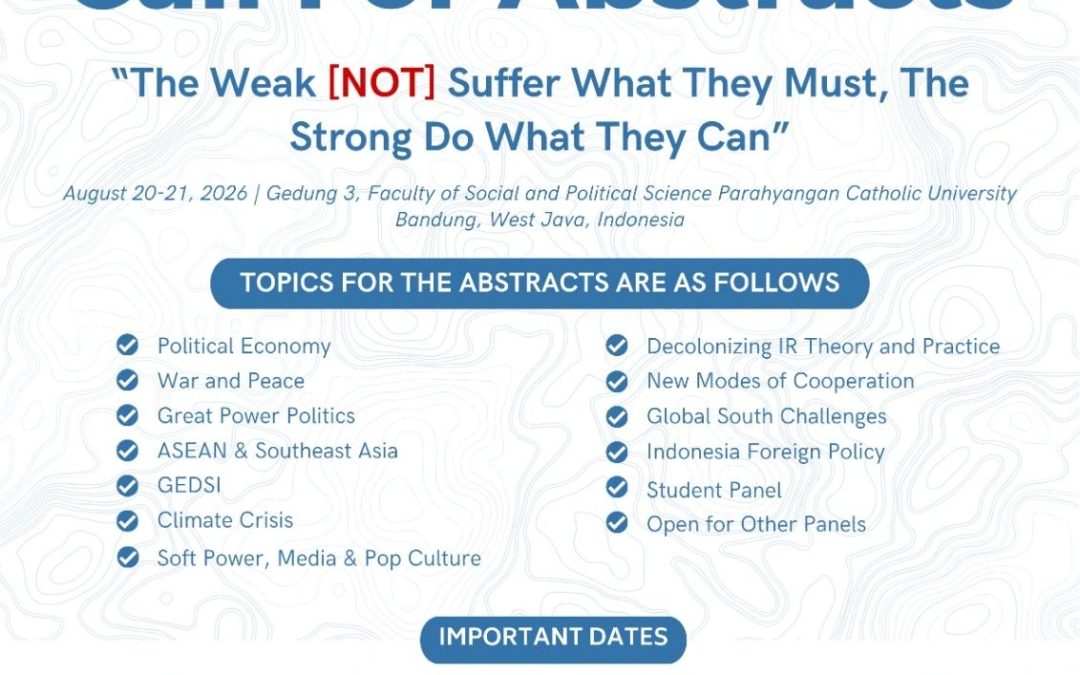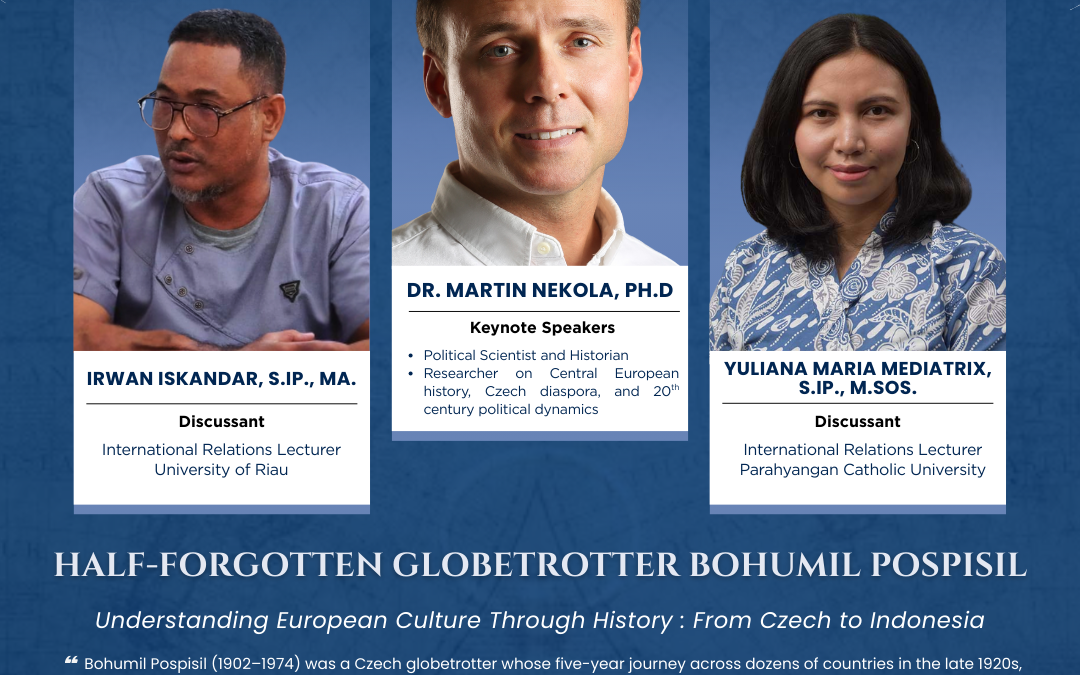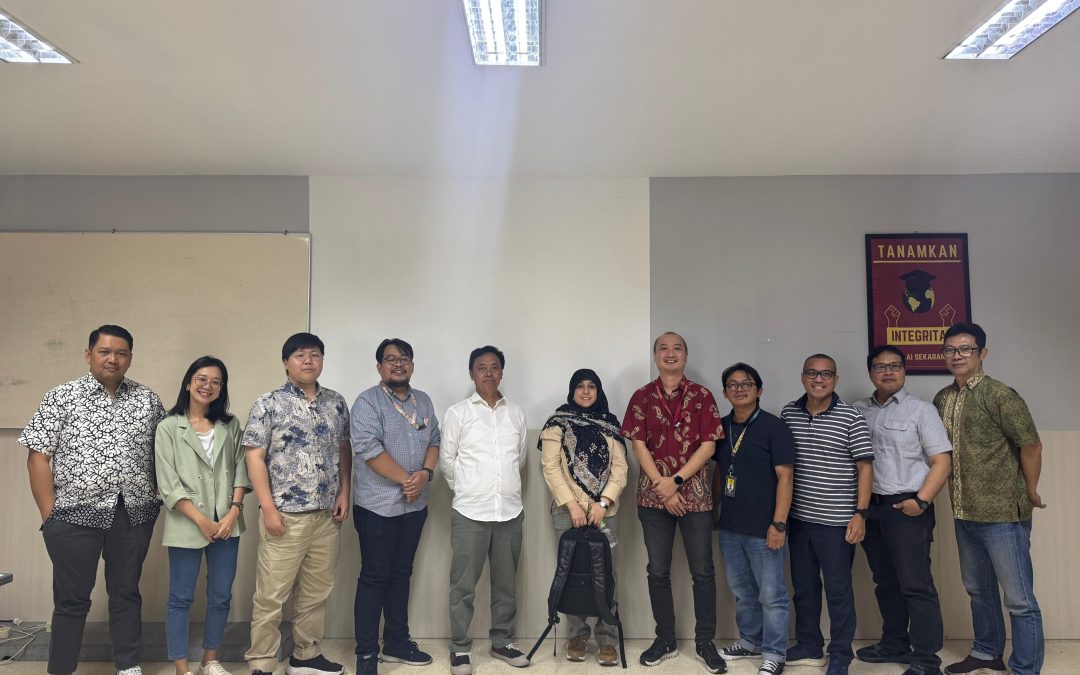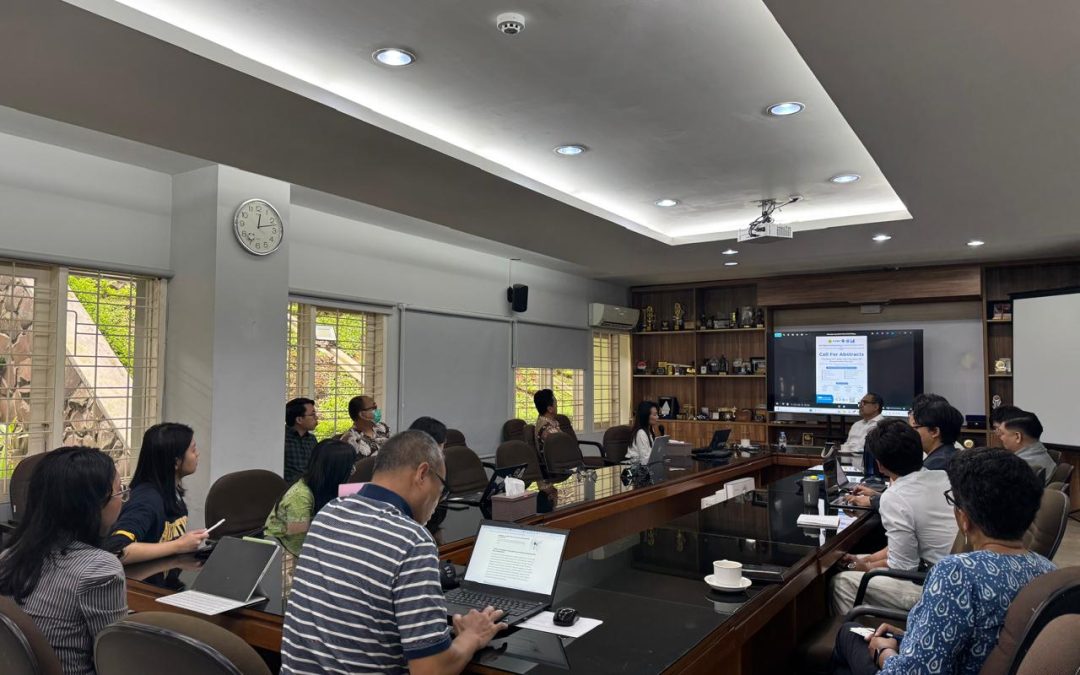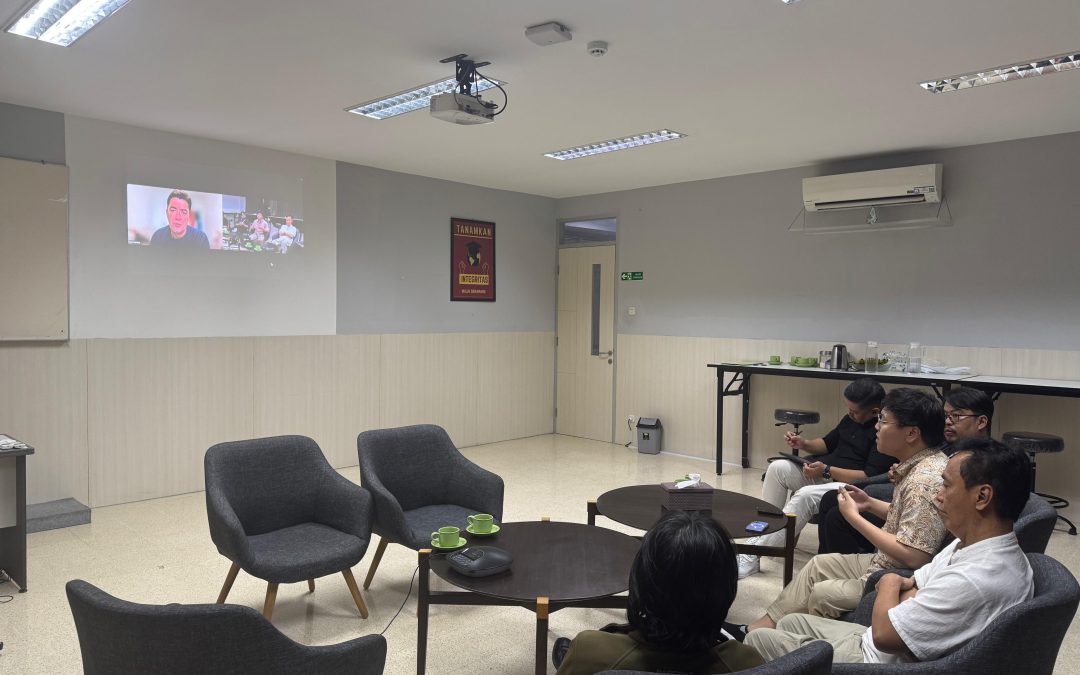International Seminar, 28 Mei 2025, Hybrid Format, @Mgr Geisse Lecture Theatre, FISIP Unpar.
The Taiwan Strait is still one of the most volatile areas in the world. It is estimated that if an open war occurs in these waters, the impact will be very large on the world order and economy. The Taiwan Strait has been an area of geopolitical tension since the end of the Chinese Civil War (1945–49) and the retreat of Chiang Kai-shek’s government and army to Formosa and the nearby islands now known as Taiwan. The United States, which initially stated that it would not get involved in the crisis in China, finally decided to send its Navy to the region to prevent an invasion from China. The US then became an ally of Taiwan and maintained the security of the “political entity” from a possible invasion from China.
Tensions in the Taiwan Strait region have flared up several times since the 1950s. The first Taiwan Strait crisis occurred in 1954–55, when the People’s Liberation Army (PLA) of China shelled three Taiwanese-controlled islands: first Quemoy (Jinmen) Island, followed by Matsu and Dachen. The second Taiwan Strait crisis occurred in 1958, when China bombed Jinmen and Matsu islands. The third Taiwan Strait crisis (1995–96) emerged after the United States granted Taiwanese President Lee Teng-hui a tourist visa in May 1995. The fourth crisis occurred in 2022 with a similar case to the third when US House Speaker Nancy Pelosi traveled to Taiwan in August 2022.
Speculation on the future of Taiwan has emerged since February 2022 following the invasion of Russia in Ukraine. There is a question whether China would invade Taiwan to secure its full control of the whole territory as the ultimate realization of One China Policy. There is also concern regarding President Trump’s new policy towards China, particularly regarding reciprocal tariffs, and its impact on Taiwan’s status. Many people see the status of Taiwan relies much on the United States’s commitment to deter any action by China in maintaining the security in the islands. The fluctuative relationship between the US and China will presumably affect the way the US will define the status of Taiwan.
Taiwan has its own responsibility to maintain peace and survival. What has the “country” done to exercise its independent autonomy to determine its own future?
Considering the importance of the issue of the Taiwan Strait, Parahyangan Center for International Studies (PACIS) organized a special seminar to understand the current situation in the Taiwan Strait.
The Seminar was held on Wednesday, 28 May 2025 at 01.00-03.00 PM (Jakarta Time) or 0200-0400 PM (Taichung Time), in a hybrid format. 130 students attended the seminar at the Mgr Geise Lecture Theatre, FISIP Unpar along with faculty members of the Internasional relations study program. Dozens of students of the Internationsl Relations, Dept of Political Science, Tunghai University joined the seminar through online platform.

Dr. Chun-Yi Lee, SFHEA, the first speaker, delivered her speech entitled: “Can Money Buy People’s Hearts and Minds? Review of Cross-Strait Economic and Security Issues?” Dr. Lee began her presentation by highlighting the principles of the foreign direct investment to suggest the reasons why country or companies would like to invest to another country because there are several reasons. She then described the historical background of Taiwanese investment in China and Chinese investment in Taiwan. The investments were very different in type and also in terms of the years and months. Having the background as political economist, Dr. Lee departed with common assumtion, arguing that there is opportunity for two countries or two societies to get closer thanks to the investment. Yet she argued it really didn’t happen in the case of China and Taiwan.
Dr Chun-Yi Lee suggests that there are many reasons that explained why Chinese money cannot buy Taiwanese’ hearts and minds. Their money to Taiwan is not a lot, even though they did actually contribute to Taiwan’s trying to buy over Taiwan’s ICT sector and also the engineers, Taiwan’s fruits, Taiwan’s fish products, and Taiwan’s agricultural products. The Chinese money doesn’t look so good for Taiwanese, because Taiwan has learned the lessons from the experience of Hong Kong in 2019. A lot of Taiwanese younger generation don’t want today’s Hong Kong to be tomorrow’s Taiwan. They realize what China said, one country, two system, just a lot. It will never happen. Yet they ended Hong Kong’s total independence or special legislative zone much earlier than they promised, 50 years.
Dr. Lee highlights that the Chinese money, although has been in Taiwan, but it’s not a lot. Chinese gestures, especially to Taiwan, has been very hostile and negative. She further suggests that “Even if we don’t talk about the direct investment on Taiwan, we’re talking about why Taiwanese doesn’t feel like the prosperity of the motherland with a question mark?” Taiwanese does not want it to be part of China, because Taiwan knew that the part of China is at the end of what Taiwan has been strive for the democracy.

Dr. Tzuli Lin, second speaker, presented his thoughts entitled: “The Security Dilemma of the Trilateral Relationship between Taiwan, China, and the United States: Ideology, Identity, or Power.”
Dr. Lin highlights the security dilemma that Taiwan is facing in building the relationship with the United States and China. As a small country, Taiwan just want to have peace and be able to survive. However, the country does not have many choices. It is very vulnerable of the shift of the international system.
Dr Lin addresses the question: Why Taiwan’s effort to enhance our own security leads China to perceive Taiwan become a stray for them? He shared his concern about the way China has responded to the Taiwanese effort to maintain peace and security, for instance by increasing military exercise, drill, and even military rehearsal to Taiwan. The security dilemma is obviously evident. As American scholars such as Bonny Lin argues, Taiwan needs to build its own defense capability to anticipate any Chinese threat. Yet this brings serious challenges from China. Every time Taiwan does more to protect itself, Taiwan will find a greater challenge from China. On the contrary, if Taiwan does less, Taiwan will not be able to defend its self. ourselves.
Dr. Lin also highlights a long time debate about Americans’ strategic ambiguity. The definition of the ambiguity refers to a premise suggesting whether the US will use the force if the war breaks out between the two sides of Taiwan Strait. This approach rely on American superior military power overwhelming to China. This assumption is combined with ambiguous policy regarding the future of peaceful resolution for Taiwan.
He argues that this strategy did work in the past especially in the era of bipolar system and unipolar period. It could maintain the peace in Taiwan Strait since ROC in Taiwan. This means it was in 1949 since the KMT moving to Taiwan, and built ROC as a country in Taiwan. However he further argues that the strategic ambiguity has failed. Especially following the modernization of the POA, this strategy is not enough to deter Beijing obviously. China has developed their navy, for example, their capacity and the speed which is six times faster than American navy. In the past, they formally preached that the US would intervene militarily if China attacks Taiwan. This assumption was being used to ensure that Beijing had to understand the serious implication if it attacked Taiwan.
This system already shifts from unipolar to multipolarity and this changes the assumption. The US strategic ambiguity initially arose from this deterioration of relations between Russia and China. We can see now the close relationship between Russia and China makes China feel they have more power to against the American. Now they see American, they do not have power advantage relative to China. When the US no longer possess the equity military deterrence capability, and then they think this ambiguity becomes very limited.

Two discussants representing PACIS gave their comments on the two speakers. Idil Syawfi raised the question about the significance of the Chinese investment in China, even though it is very small. He also presented the concern about the impact of the shifting international system from bipolar to multipolar system. He highlights the rising concerted multipolarity where great powers, the US, China, and Russia have their own regions’ sphere of influence.

Ratih Indraswari commended the presentation delivered by both speakers who are, in her view, sharing common conception of the asymetric relationship. Dr. Tzuli Lin points out more on the asymetric military alliance, while Dr. Yun-Chi Lee focused on asymetric economic relationship. Dr. Indraswari suggests the implication caused by the asymetric relationship. Taiwan is very fragile towards the changes of relationship between great powers. Ratih raises the question about the extent towhich Taiwan has a strategic autonomy in this uncertain context. She also raises concern about the role of international organization to help Taiwan and other nations facing the similar situation in building peace and security.
Prof. Sukawarsini Djelantik chaired the seminar which was attended by more than 120 students of Parahyangan Catholic University and faculty members of the Internasional relations program Study as well dozens of students at Department of Political Science, Tunghai University.



